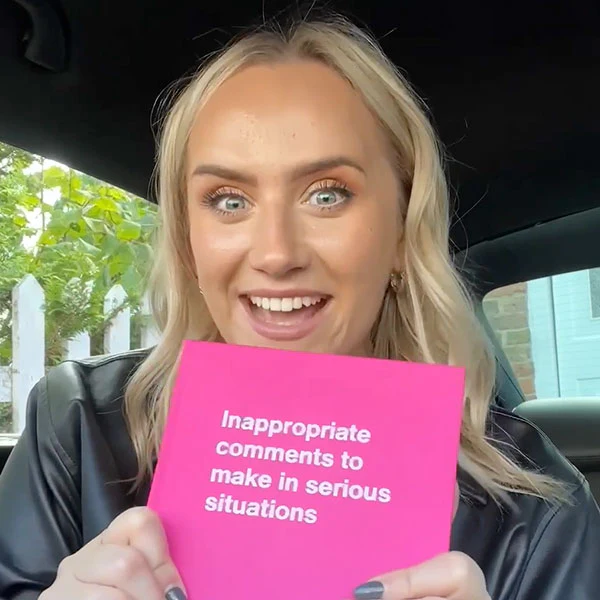Why do we all use cringey corporate jargon (and where does it come from)?
Noteworthy
August 3, 2025, by WTF Notebooks


You open your inbox on a Monday morning and there it is: Your boss has looped you in. A client wants to pivot. And you’ve been asked to drill down into last quarter’s metrics and share key takeaways in tomorrow’s standup.
And instead of screaming into your ergonomic back pillow, you reply that you’ll do a deep dive and circle back.
Congratulations – you’re officially fluent in Corporate Jargon™, the native tongue of office workers everywhere.
Although we all cringe internally, nearly every office worker has inadvertently undergone the beige brainwashing and found themselves guilty of using corporate lingo every once in a while. Whether it’s stepping into a corporate building, or clicking “Join” on a Zoom meeting, people’s language transforms from human to synergy cyborg the moment they enter the corporate world.
But where did this cursed dialect even come from? And why are we all still running things up the flagpole like it’s 1965?
The rise of the beige buzzwords
Corporate jargon sits in a weird place in our lives. We all know it’s ridiculous but we keep using it because it makes us sound like we know what we’re doing.
Linguists call this stuff jargon — vocabulary meant to make communication more efficient within an industry or group of like-minded people. Which sounds noble until you realise the words we’re using aren’t actually that efficient. If you’ve ever heard someone say “Let’s table this,” then had to figure out whether that means discuss it now or pretend it never existed, you know what we mean.
Jargon isn’t really about clarity. It’s about status. Using phrases like “ROI,” “leverage,” or “mission-critical” says: I belong here. I’m one of you. Please don’t fire me.

From battlefield to boardroom
A lot of the nonsense we now toss around in emails actually started on literal battlefields. After World War II, veterans returned home and filled the growing ranks of corporate America — and they brought military language with them. That’s how we ended up with phrases like “boots on the ground,” “all hands on deck,” and “mission-critical” in meetings about sales performance.
Later, sports metaphors muscled their way in. Baseball gave us “home run ideas” and “in my wheelhouse,” where the wheelhouse originally referred to a batter’s sweet spot for knocking a pitch “out of the park”. Basketball contributed “slam dunk,” which now gets thrown around whenever someone suggests a new font for the annual report.
By the time the Mad Men era rolled around, advertising execs wanted their ideas to get noticed — so they started saying things like “Let’s run it up the flagpole,” as if they were hoisting a concept in the air to see if anyone saluted. Finance bros in the ’80s brought us “leverage,” “low-hanging fruit,” and “maximize ROI.” And then tech bros in the 2000s arrived with their “bandwidth” and “double-clicking on that.”
Every industry that considered itself the centre of the universe brought its own linguistic baggage with it. And now we’re stuck with the lot.

The Jargon Olympics
Let’s be honest: a lot of this language exists so we don’t have to say what we really mean.
“We’re restructuring” is a fancy excuse to fire someone, while “let’s take this offline” is corporate dialect for “stop talking.” And when you suggest to “circle back”, you really just want to move on and hope that everyone forgets.
But if corporate jargon is so inefficient, then why do we even bother with it? Why do we keep using this gibberish? Because it signals that we’re in the know.
Research even shows that junior employees use more jargon than their bosses – trying to prove they belong by sounding like a quarterly earnings call in human form. And it’s working.
Corporate jargon is basically the office version of high school slang. It changes every decade, but the pressure to fit in never dies.
Final thoughts & “action items”
Corporate jargon is a virus with a business degree. Nobody loves it, but we’re all a little infected. We might not be able to ban buzzwords from our team syncs, but we also don’t need to take them as seriously as they make themselves out to be.
If you’re ready to bring a little humour back into the office without triggering an HR meeting, join leading companies like Google, Netflix, and PWC in making office life a little more bearable with WTF Notebooks.
From journals titled “My book to write in to appear busy” to annual planners titled “Meetings that could have been emails” – we make office stationery for people who suffer through “drilling down” and “circling back” but still want to hold onto their sanity.
WTF Notebooks make brilliant, customizable corporate gifts — for team wins, employee appreciation, Secret Santa chaos, or just subtly roasting the guy who loves to “move the needle”. In a sea of company mugs, branded stress balls, and other cliché corporate gifts, this is what “thinking outside the box” actually looks like. Those big-ass companies we mentioned earlier? Yep, they’ve all placed custom bulk orders.
Whether you’re scribbling meeting notes, fake KPIs, or just a silent scream — we’ve got you covered. Check out our NSFW collection or browse our entire range of hilarious office notebook titles, then customize your own or get in touch to discuss custom branding options.
Because if we have to swim in buzzwords and corporate slang, we might as well float on tongue-in-cheek humor and a lighthearted office culture.
Ordinary is overrated
WTF Notebooks are here to make you laugh out loud. Custom-printed to order, they are the perfect gift for friends, family, co-workers or yourself. Say goodbye to boring notebooks and hello to WTF Notebooks!
Learn more


Grab your free printable shit list
Let us clog up your inbox and we’ll send you a free, printable to-do list for all the ‘Shit you need to get done but probably won’t’
Be the first to know about new title releases, email-exclusive promotions, and other noteworthy news
We won’t spam you, that’s a pinky promise!








